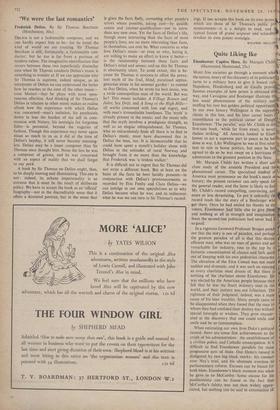'We were the last romantics'
Frederick Delius. By Sir Thomas Beecham. (Hutchinson, 30s.)
DELIUS is not a fashionable composer, and we can hardly expect him to be: for he hated the kind of world we are creating. Sir Thomas Beecham is still, fortunately, a fashionable con- ductor; but he too is far from a partisan of modern values. The imaginative identification that occurs between these two superficially dissimilar men when Sir Thomas conducts Delius's music is something to wonder at. If we can appreciate why Sir Thomas is supreme, indeed unique, as an interpreter of Delius we can understand the better how he reaches to the core of the other music— even Mozart—that he plays with most spon- taneous affection. And thinking of Sir Thomas's Delius in relation to other music makes us realise afresh how the experience with which Delius was concerned—man's isolation, his pantheistic desire to lose the burden of the self in com- munion with Nature, his nostalgia for forgotten Eden—is perennial, beyond the vagaries of fashion. Though this experience may never again mean so much to us as it did at the time of Delius's heyday, it will never become meaning- less. Delius may be a lesser composer than Sir Thomas once thought him. None the less he was a composer of genius, and he was concerned with an aspect of reality that we shall forget to our peril.
A book by Sir Thomas on Delius ought, then, to be deeply moving and illuminating. This one is not: indeed, its urbane impersonality is so extreme that it must be the result of deliberate policy. We have to accept the book as an 'official' biography—not in the discreditable sense that it offers a doctored portrait, but in the sense that
it gives the facts flatly, correcting other people's errors where possible, taking care—by qualifi- cation and counter-qualification—not to intro- duce any new ones. Yet the facts of Delius's life, though more interesting than the facts of most people's lives, are no more interesting than facts, in themselves, can ever be. What concerns us who love Delius's music—or even us who, hating it, are willing to make an effort to know it better— is the relationship between these facts and Delius's mind and senses; and on this Sir Thomas is obstinately silent. To some extent, this is be- cause Sir Thomas is anxious to offset the preva- lent myth of the frail, blind, paralysed septua- genarian alone in his summer garden : to remind us that Delius, when he wrote his best music, was a virile cosmopolitan man of the world. But was he? This music includes A Village Romeo and Juliet, Sea Drift, and A Song of the High Hills— all works concerned with loss arkd regret, and with man's irremediable loneliness. The 'myth' is already present in the music; and the music tells that the myth involves a prodigious strength, as well as an elegiac relinquishment. Sir Thomas, who so miraculously finds all there is to find in Delius's music, must have discovered this in Delius the man, too. It is inconceivable that he could have spent a month's holiday alone with Delius in the solitudes of rural Norway and brought from it no more than the knowledge that Frederick was 'a tireless walker.'
It is difficult not to regret that Sir Thomas did not write a different book. But at least on the basis of the facts he here lucidly presents—in conjunction with Delius's pronouncements as recorded by Eric Fenby and Clare Delius—we can indulge in our own speculations as to why Delius became what he was; and to rediscover what he was we can turn to Sir Thomas's record-
ings. If one accepts this book on its own terms which are those of Sir Thomas's public pr nouncements—it is a delight to read, and typical fusion of grand seigneur and schoolbo invokes its own potent nostalgia.
WILFRID MELLE






































































 Previous page
Previous page